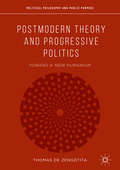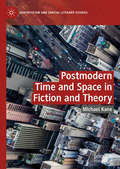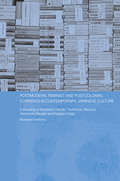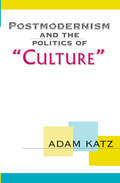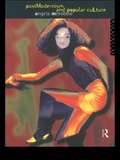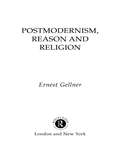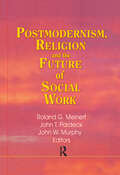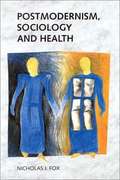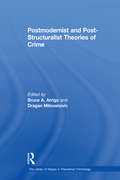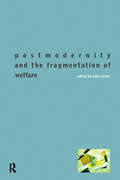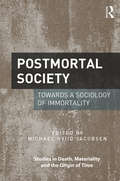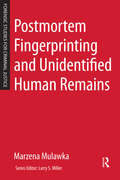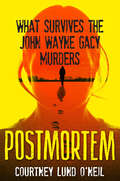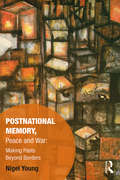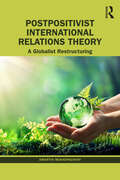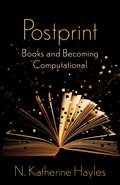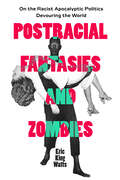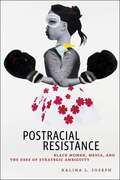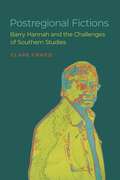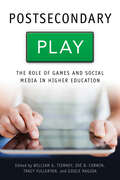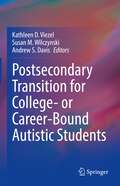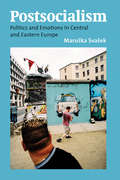- Table View
- List View
Postmodern Theory and Progressive Politics: Toward a New Humanism (Political Philosophy and Public Purpose)
by Thomas De ZengotitaThis book examines the lasting influence of the academic culture wars of the late 20th century on the humanities and progressive politics, and what to make now of those furious debates over postmodernism, multiculturalism, relativism, critical theory, deconstruction, post-structuralism, and so on. In an effort to arrive at a fair judgment on that question, the book reaches for an understanding of postmodern theorists by way of two genres they despised; and hopes, for that reason, to do them justice. The story, in its telling, justifies two basic claims: first, that the phenomenological/hermeneutical tradition is the most suitable source of theory for a humanism that aspires to be truly universal; and, second, that the ethical and political aspect of the human condition is authentically accessible only through narrative. In conclusion, it argues that the postmodern moment was a necessary one, or will have been if we rise to the occasion—and that that is its historical significance.
Postmodern Time and Space in Fiction and Theory (Geocriticism and Spatial Literary Studies)
by Michael KanePostmodern Time and Space in Fiction and Theory seeks to place the contemporary transformation of notions of space and time, often attributed to the technologies we use, in the context of the ongoing transformations of modernity. Bringing together examples of modern and contemporary fiction (from Defoe to DeLillo, Frankenstein to Finnegans Wake) and theoretical discussions of the modern and the post-modern, the author explores the legacy of modern transformations of space and time under five headings: “The Space of Nature”; “The Space of the City”; “Postmodern or Most Modern Time”; “The Time and Space of the Work of Art in the Age of Digital Reproduction”; and “Travel: from Modernity to…?”. These five essays re-examine the meanings of modernity and its aftermath in relation to the spaces and times of the natural, the urban and the media environment.
Postmodern, Feminist and Postcolonial Currents in Contemporary Japanese Culture: A Reading of Murakami Haruki, Yoshimoto Banana, Yoshimoto Takaaki and Karatani Kojin (Routledge/Asian Studies Association of Australia (ASAA) East Asian Series)
by Fuminobu MurakamiUsing the Euro-American theoretical framework of postmodernism, feminism and post-colonialism, this book analyses the fictional and critical work of four contemporary Japanese writers; Murakami Haruki, Yoshimoto Banana, Yoshimoto Takaaki and Karatani Kojin. In addition the author reconsiders this Euro-American theory by looking back on it from the perspective of Japanese literary work. Presenting outstanding analysis of Japanese intellectuals and writers who have received little attention in the West, the book also includes an extensive and comprehensive bibliography making it essential reading for those studying Japanese literature, Japanese studies and Japanese thinkers.
Postmodernism And The Politics Of 'Culture'
by Adam KatzPostmodernism and the Politics of 'Culture' is a comparative critical analysis of the political and intellectual ambitions of postmodernist critical theory and the academic discipline of cultural studies. Katz's polemical aim is to show that cultural studies comes up short in both areas, because its practitioners focus on too-narrow issues-primarily, celebrating the folkways of micro-communities-while denying the very possibility of studying, understanding, and changing society in any comprehensive way and to any universally beneficial purpose. He argues that scholars and activists alike would do well to make use of the analytical tools of postmodernist critical theory, whose practitioners acknowledge the political significance of the differences between social groups, but do not consider them to be unbridgeable, and so seek to develop a set of practices for creating a truly inclusive, truly democratic public sphere.
Postmodernism and China
by Arif Dirlik Xudong ZhangFew countries have been so transformed in recent decades as China. With a dynamically growing economy and a rapidly changing social structure, China challenges the West to understand the nature of its modernization. Using postmodernism as both a global frame of periodization and a way to break free from the rigid ideology of westernization as modernity, this volume's diverse group of contributors argues that the Chinese experience is crucial for understanding postmodernism. Collectively, these essays question the implications of specific phenomena, like literature, architecture, rock music, and film, in a postsocialist society. Some essays address China's complicity in--as well as its resistance to--the culture of global capitalism. Others evaluate the impact of efforts to redefine national culture in terms of enhanced freedoms and expressions of the imagination in everyday life. Still others discuss the general relaxation of political society in post-Mao China, the emergence of the market and its consumer mass culture, and the fashion and discourse of nostalgia. The contributors make a clear case for both the historical uniqueness of Chinese postmodernism and the need to understand its specificity in order to fully grasp the condition of postmodernity worldwide. Although the focus is on mainland China, the volume also includes important observations on social and cultural realities in Hong Kong and Taiwan, whose postmodernity has so far been confined--in both Chinese and English-speaking worlds--to their economic and consumer activities instead of their political and cultural dynamism. First published as a special issue of boundary 2, Postmodernism and China includes seven new essays. By juxtaposing postmodernism with postsocialism and by analyzing China as a producer and not merely a consumer of the culture of the postmodern, it will contribute to critical discourses on globalism, modernity, and political economics, as well as to cultural and Asian studies. Contributors. Evans Chan, Arif Dirlik, Dai Jinhua, Liu Kang, Anthony D. King, Jeroen de Kloet, Abidin Kusno, Wendy Larson, Chaoyang Liao, Ping-hui Liao, Sebastian Hsien-hao Liao, Sheldon Hsiao-peng Lu, Wang Ning, Xiaobing Tang, Xiaoying Wang, Chen Xiaoming, Xiaobin Yang, Zhang Yiwu, Xudong Zhang
Postmodernism and Popular Culture
by Angela Mcrobbie Angela McRobbiePostmodernism and Popular Culture brings together eleven recent essays by Angela McRobbie in a collection which deals with the issues which have dominated cultural studies over the last ten years.A key theme is the notion of postmodernity as a space for social change and political potential. McRobbie explores everyday life as a site of immense social and psychic complexity to which she argues that cultural studies scholars must return through ethnic and empirical work; the sound of living voices and spoken language. She also argues for feminists working in the field to continue to question the place and meaning of feminist theory in a postmodern society. In addition, she examines the new youth cultures as images of social change and signs of profound social transformation.Bringing together complex ideas about cultural studies today in a lively and accessible format, Angela McRobbie's new collection will be of immense value to all teachers and students of the subject.
Postmodernism, Reason and Religion
by Ernest GellnerFirst Published in 1992. Routledge is an imprint of Taylor & Francis, an informa company.
Postmodernism, Religion, and the Future of Social Work
by John W Murphy Jean A Pardeck Roland MeinertPostmodernism, Religion, and the Future of Social Work discusses the benefits and disadvantages of the postmodern philosophy as a foundation for social work and human service practice. Social work students and practitioners will learn about the developments that have shaped postmodern thinking as they pertain to society in general, as well as to the profession of social work. By exploring this increasingly popular philosophy, Postmodernism, Religion, and the Future of Social Work provides you with methods and theories that help you evalute contemporary problems more effectively, resulting in better services for your clients.Challenging traditional social work practices, Postmodernism, Religion, and the Future of Social Work examines postmodernism in terms of a world view that is emerging along indeterminate and ambiguous lines. With the goal of helping you provide more helpful and relevant services to your clients, Postmodernism, Religion, and the Future of Social Work discusses many themes related to postmodernism, including: understanding how principles of postmodernism are characterized by ongoing change, indeterminacy, and relativism reviewing the historical movement of a postmodern perspective and its present implications on social work practice supporting the strengths perspective through a postmodernist approach discussing some unintended and potentially negative consequences of postmodernism that arise from uncritically adopting postmodernistic principles analyzing the nature of social work and social welfare in Britain and the Western World to gain insight into how social theory is associated with postmodernity, postmodernization, and post-Fordism exploring the postmodernistic relationship between institutionalized religions and social services provided by religious auspices Although postmodernism offers a new and different way of understanding social problems and of structuring social work practice, this text urges you to be critical in the evaluation of its aspects and outlines some possibly negative outcomes in certain situations. In evaluating postmodernism and its relevance to social services and social problems, Postmodernism, Religion, and the Future of Social Work offers theories and research into methods that go beyond traditional practices to assist you in providing effective and relevant services for your clients.
Postmodernism, Sociology and Health
by Nicholas J. FoxThe emergence of post-structuralism and postmodernism within social theory has challenged many of the fundamentals of modernist social science. The emphasis which these approaches place on language, firstly as the unavoidable mediator between an object of study and a description of that object, and secondly as something which is profoundly unstable, marks the broadest of these challenges -- to the possibility that sociology and the other human sciences might achieve rational knowledge of the world.
Postmodernist and Post-Structuralist Theories of Crime (The\library Of Essays In Theoretical Criminology Ser.)
by Dragan MilovanovicThis volume presents the rich and provocative historical, theoretical, methodological, and applied developments within affirmative postmodern and post-structural criminology. This includes the evolution of thought that embraces the "linguistic turn" in crime, law justice, and social change. Previously-published articles authored by key thinkers are included throughout the book's five substantive sections. Collectively, they represent important reflections on the current criminological landscape in which symbolic, linguistic, material, and cultural realms of analyses are featured.
Postmodernity and the Fragmentation of Welfare
by John CarterPostmodern ideas have been vastly influential in the social sciences and beyond. However, their impact on the study of social policy has been minimal. Postmodernity and the Fragmentation of Welfare analyses the potential for a postmodern or cultural turn in welfare as it treats postmodernity as an evolving canon -from the seminal works of Baudrillard, Foucault and Lyotard, through to recent theories of the 'risk society'. Already disorientated by globalisation, new technologies and the years of new right ascendancy, welfare faces a significant challenge in the postmodern. It suggests that, rather than universality and state provision, the new social policy will be consumerised and fragmented -a welfare state of ambivalence. With contributions from authors coming from a variety of fields offering very different perspectives on postmodernity and welfare Postmodernity and the Fragmentation of Welfare also keeps social policy's intellectual inheritance in view. By exploring ways in which theorisations of postmodernity might improve understanding of welfare issues in the 1990s and assessing the relevance of theories of diversity and difference to mainstream and critical social policy traditions, this book will be and essential text for all students of social policy, social administration, social work and sociology.
Postmortal Society: Towards a Sociology of Immortality (Studies in Death, Materiality and the Origin of Time)
by Michael Hviid JacobsenThroughout history mankind has struggled to reconcile itself with the inescapability of its own mortality. This book explores the themes of immortality and survivalism in contemporary culture, shedding light on the varied and ingenious ways in which humans and human societies aspire to confront and deal with death, or even seek to outlive it, as it were. Bringing together theoretical and empirical work from internationally acclaimed scholars across a range of disciplines, Postmortal Society offers studies of the strategies adopted and means available in modern society for trying to ‘cheat’ death or prolong life, the status of the dead in the modern Western world, the effects of beliefs that address the terror of death in other areas of life, the ‘immortalisation’ of celebrities, the veneration of the dead in virtual worlds, symbolic immortality through work, the implications of understanding ‘immortality’ in chemical-neuronal terms, and the apparent paradox of our greater reverence for the dead in increasingly secular, capitalist societies. A fascinating collection of studies that explore humanity’s attempts to deal with its own mortality in the modern age, this book will appeal to sociologists, anthropologists, philosophers and scholars of cultural studies with interests in death and dying.
Postmortem Fingerprinting and Unidentified Human Remains
by Marzena MulawkaFingerprint identification is the most efficient, rapid, and cost-effective forensic identification modality. Postmortem Fingerprinting and Unidentified Human Remains is a consolidated and thorough guide to the recovery, identification, and management of unidentified postmortem fingerprint records - topics from postmortem fingerprint processing to database submission and case management are discussed. Additionally, a postmortem processing workflow is described, which delineates various basic and advanced fingerprint recovery techniques used to acquire examination-quality records. Furthermore, Postmortem Fingerprinting and Unidentified Human Remains discusses the complexity of antemortem fingerprint databases and how to access each database for humanitarian purposes, bringing a modern value perspective to the topic.
Postmortem: What Survives the John Wayne Gacy Murders
by Courtney Lund O'NeilIn the vein of the bestselling I&’ll Be Gone in the Dark, this compelling work of true crime explores the aftershocks of "Killer Clown" John Wayne Gacy's crimes with a uniquely intimate slant, as the daughter of a key witness probes her mother's personal experiences and the legacy of murder within a family, a community, and the American psyche.&“A beautifully written memoir about the haunting impact of a sensational crime. I'm still thinking about it.&” —Gregg Olsen, #1 New York Times bestselling author On a December night in 1978, Courtney Lund O&’Neil&’s mother, teenaged Kim Byers, saw her friend Rob Piest alive for the last time. At the end of his shift at the pharmacy where they both worked, fifteen-year-old Rob went outside to speak to a contractor named John Wayne Gacy about a possible job. That night Rob became Gacy&’s final victim; his body was later found in the Des Plaines River. Kim&’s testimony, along with a receipt belonging to her found in Gacy&’s house, proving that Rob had been there, would be pivotal in convicting the serial killer who assaulted and killed over thirty young men and boys. Though she grew up far from Des Plaines, Courtney has lived in the shadow of that nightmare, keenly aware of its impact on her mother. In search of deeper understanding and closure, Courtney and Kim travel back to Illinois. Postmortem transforms their personal journey into a powerful exploration of the ever-widening ripples generated by Gacy&’s crimes. From the 1970s to the present day, his shadow extends beyond the victims&’ families and friends—it encompasses the Des Plaines neighborhood forever marked by his horrific murders, generations of the victims&’ families and friends, those who helped arrest and convict him, fandom communities, and many others. Layered and thought-provoking, Postmortem is a complex story of loss and violence, grief and guilt, and the legacy that remains long after a killer is caught.
Postnational Memory, Peace and War: Making Pasts Beyond Borders (Memory Studies: Global Constellations)
by Nigel YoungThis book examines the phenomenon of modern memory as a reaction to total war, an aspiration to truth-seeking provoked by the independent forces of modern war and collective violence which is transnational, or postnational, in character. Using examples from prose and poetry, film and theatre, painting and photography, and music and the popular arts, the author traces a narrative path through the events of the twentieth century, defining the tradition of modern memory in terms of its essentially anti-militaristic, anti-war character, as expressed in the manner in which it represents recalled violence and atrocity. Through a series of thematic discussions of two world wars, the Shoah, urbicide and nuclear weapons, Postnational Memory explores the formation of transnational memory, drawing on examples from industrialized societies, with a focus on memory of real events and their reproduction in literature and the arts, often including personal recollections that link the self to the represented past. As such, by asking how the concept of modern memory is constructed through the victims of war and genocide, the book constitutes an alternative to national memories and hegemonic, militarist or ethnocentric histories. Surveying the emergence of new, transnational forms of remembering the past, it will appeal to students and scholars of sociology, memory studies and peace studies, as well as those working in disciplines such as modern and international history, cultural studies and military studies.
Postnationalism and the Challenges to European Integration in Greece
by Kostas MaronitisThis book is a study into how immigration is transforming the EU and its member-states. Kostas Maronitis contends that immigration creates utopian and dystopian visions of the European project. These visions can be found in the immigration detention centers and the fences between member-states, the dead bodies on Europe's shores, the electoral success of far-Right parties, and in the way migrants and refugees view Europe as a land of rights and equality. Maronitis locates the transformative power of immigration at the intersection of sentiments regarding national and ethnic hierarchies with a policy framework constructed around the presence of migrants and refugees in Europe. By examining the utopian and dystopian transformation of the EU and of Greece as its borderland, the author challenges established notions of integration, citizenship and nationality on new intellectual and political terms. The book will be of use to students and scholars specializing in migration, EU policy and Greece, and will have a wider appeal for those interested in the ongoing debate surrounding the EU and immigration.
Postpolitics and the Aesthetic Imagination
by Juan MenesesIgniting political power through the lens of art and the imaginationPostpolitics and the Aesthetic Imagination investigates the erosion of meaningful political action in today&’s world. Gathering writings from an array of scholars, editor Juan Meneses asks: can an aesthetic theory of postpolitics help us understand and counteract the most insidious processes of depoliticization? The contributors to this volume explore how the aesthetic imagination can play a crucial role in reenvisioning key political elements, including governance, agency, rights, and responsibility. With a survey of various artistic mediums—film, dance, music, literature, and digital media—the essays illustrate how the aesthetic can reveal ways to breathe new life into the work of emancipatory politics. Reclaiming the arts and humanities as vital to political life, the contributors revisit but also move beyond the social sciences&’ central focus on neoliberalism and public administration to address other topics such as tech-capitalism, race, environmental violence, and patriarchy. Postpolitics and the Aesthetic Imagination argues for a conscious deployment of aesthetics to resist political anesthesia and promote a more just society, underscoring the role of the imagination in political engagement and change. Contributors: Jacquelyn Arcy, U of Wisconsin–Parkside; Christopher Breu, Illinois State U; Stephen Charbonneau, Florida Atlantic U; Eric Lemmon, Webster U; Robert P. Marzec, Purdue U; Allison Page, Rutgers U–Camden; Matthew Scully, U of Lausanne; Erik Swyngedouw, U of Manchester; Sherryl Vint, U of California, Riverside.
Postpositivist International Relations Theory: A Globalist Restructuring
by Amartya MukhopadhyayThis book discusses postpositivist theories foregrounding postpositivism against the reigning realist and positivist-pluralist orthodoxies. The book explicates seven theories, not as disparate endeavours, but as developments linked by a common thread that seeks to enunciate globalist emancipatory goals for the theoretical field and the world that these theories seek to change. It focuses on the following themes: feminism, environmentalism or green theory, the English school, critical theory, constructivism, postmodernism and postcolonialism. Additionally, a separate chapter on globalization shows that while mainstream (neo)realist international relations theories respond hostilely to globalization and liberal-pluralist theories react benignly to it, postpositivist theories positively welcome it. The book offers a competent meta-theoretical gridwork, showing on which side of the opposing disciplinary positions in the fourth debate each of the seven theories are located. It is a comprehensive guide to the postpositivist restructuring of the discipline of international relations. This book will be of interest to researchers and students of political science, international relations, history, humanities and literature.
Postprint: Books and Becoming Computational (The Wellek Library Lectures #109)
by N. Katherine HaylesSince Gutenberg’s time, every aspect of print has gradually changed. But the advent of computational media has exponentially increased the pace, transforming how books are composed, designed, edited, typeset, distributed, sold, and read. N. Katherine Hayles traces the emergence of what she identifies as the postprint condition, exploring how the interweaving of print and digital technologies has changed not only books but also language, authorship, and what it means to be human.Hayles considers the ways in which print has been enmeshed in literate societies and how these are changing as some of the cognitive tasks once performed exclusively by humans are now carried out by computational media. Interpretations and meaning-making practices circulate through transindividual collectivities created by interconnections between humans and computational media, which Hayles calls cognitive assemblages. Her theoretical framework conceptualizes innovations in print technology as redistributions of cognitive capabilities between humans and machines. Humanity is becoming computational, just as computational systems are edging toward processes once thought of as distinctively human. Books in all their diversity are also in the process of becoming computational, representing a crucial site of ongoing cognitive transformations.Hayles details the consequences for the humanities through interviews with scholars and university press professionals and considers the cultural implications in readings of two novels, The Silent History and The Word Exchange, that explore the postprint condition. Spanning fields including book studies, cultural theory, and media archeology, Postprint is a strikingly original consideration of the role of computational media in the ongoing evolution of humanity.
Postracial Fantasies and Zombies: On the Racist Apocalyptic Politics Devouring the World (Environmental Communication, Power, and Culture #5)
by Eric King WattsThis book understands the postracial as a genre—like the zombie apocalypse—that signals a disturbance in society that is felt as terrifying and exciting. The postracial is repetitive and reproduces blackened biothreat bodies, rituals of securitization, and fantasies of the reclamation of white masculine sovereignty. Eric King Watts examines key moments when Blackness became an object of knowledge in the eighteenth and nineteenth centuries, preparing the "scientific" and philosophical ground for interpreting zombie lore. The book treats the "Greater Caribbean" as a transformative space in which an antiblack infrastructure arose and interrogates the US's militarized domination of Haiti that was the context in which the zombie emerged. Watts traces variations of the form and function of the zombie to contemplate how it matters to our contemporary struggles with racism and pandemic policies.
Postracial Resistance: Black Women, Media, and the Uses of Strategic Ambiguity (Critical Cultural Communication #27)
by Ralina L. JosephWinner, 2019 Outstanding Book Award, International Communication AssociationHow Black women in the spotlight negotiate the post-racial gaze of Hollywood and beyond From Oprah Winfrey, Michelle Obama, and Shonda Rhimes to their audiences and the industry workers behind the scenes, Ralina L. Joseph considers the way that Black women are required to walk a tightrope. Do they call out racism only to face accusations of being called “racists”? Or respond to racism in code only to face accusations of selling out? Postracial Resistance explores how African American women celebrities, cultural producers, and audiences employ postracial discourse—the notion that race and race-based discrimination are over and no longer affect people’s everyday lives—to refute postracialism itself. In a world where they’re often written off as stereotypical “Angry Black Women,” Joseph offers that some Black women in media use “strategic ambiguity,” deploying the failures of post-racial discourse to name racism and thus resist it.In Postracial Resistance, Joseph listens to and observes Black women as they perform and negotiate race in strategic ambiguity. Using three methods of media analysis—textual readings of the media's representation of these women; interviews with writers, producers, and studio executives; and audience ethnographies of young women viewers—Joseph maps the tensions and strategies that all Black women must engage to challenge the racialized sexism of everyday life, on- and off-screen.
Postregional Fictions: Barry Hannah and the Challenges of Southern Studies (Southern Literary Studies)
by Clare ChaddDrawing from recent debates about the validity of regional studies and skepticism surrounding the efficacy of the concept of authenticity, Clare Chadd’s Postregional Fictions focuses on questions of southern regional authenticity in fiction published by Barry Hannah from 1972 to 2001. The first monograph on the Mississippi author’s work to appear since his death, this study considers the ways in which Hannah’s novels and short stories challenge established conceptual understandings of the U.S. South. Hannah’s writing often features elements of metafiction, through which the putative sense of “southernness” his stories dramatize is complicated by an intense self-reflexivity about the extent to which a sense of place has never been foundational or essential but has always been constructed and performed. Such texts locate a productive terrain between the local and the global, with particular relevance for critical apprehensions of the post-South and postsouthern literature. Offering sustained close readings of selected stories, and focusing especially on Hannah’s late work, Chadd argues that his fiction reveals the region constantly shifting in a process of mythmaking, dialogue, and performance. In turn, she uses Hannah’s work to suggest how notions of the “South” and “southernness” might survive the various deconstructive approaches leveled against them in recent decades of southern studies scholarship. Rather than seeing an impasse between the regional and the global, Chadd’s reading of Hannah shows the two existing and flourishing in tandem.In Postregional Fictions, Chadd offers a new interpretation of Hannah based on an appreciation of the vital intersection of southern and postmodern elements in his work.
Postsecondary Play: The Role of Games and Social Media in Higher Education (Tech.edu: A Hopkins Series on Education and Technology)
by William G. Tierney, Zoë B. Corwin, Tracy Fullerton and Gisele RagusaGames and social media can improve college access, attract and support students, and boost rates of completion.The college application process—which entails multiple forms, essays, test scores, and deadlines—can be intimidating. For students without substantial school and family support, the complexity of this process can become a barrier to access. William G. Tierney, Tracy Fullerton, and their teams at the University of Southern California approach this challenge innovatively. Using the tools of online games and social media, they have developed ways to make applying for college much less intimidating.While the vast majority of college students use social media and gaming in their everyday lives, colleges and universities have been slow to recognize and harness the power of either. Postsecondary Play explores the significance of games and social media in higher education, and particularly how they can be used to attract, retain, educate, and socialize students.Tierney, a past president of the American Educational Research Association, has gathered some of the best research on the emerging role of games and social media in the classroom and how these tools can boost student confidence and increase college access. Scholars writing from a wide variety of disciplines—college access, social media, game studies, and learning sciences—provide concrete examples to illustrate the new and complex ways in which students learn in response to social media and games. Tierney and the contributors find that, although games can be powerful tools for encouraging underserved students, quality game design and mastering the concept of play—the ability to develop skills while engaging in the game—are essential in the effective use of serious games in teaching and learning.Summarizing a decade of research in game design and learning, Postsecondary Play will appeal to higher education scholars and students of learning, online gaming, education, and the media.
Postsecondary Transition for College- or Career-Bound Autistic Students
by Andrew S. Davis Susan M. Wilczynski Kathleen D. ViezelThis book examines issues relating to postsecondary transition from high school to college or competitive vocational settings for Autistic adolescents and young adults. It details the intervention and consultation services essential to prepare students for postsecondary life. The volume addresses the academic, social, self-regulation, and self-sufficiency skills that adolescents and young adults must develop to ensure a successful transition from high school to college and workplace. It focuses on the role of school psychologists in supporting Autistic students as they enter adulthood but is also relevant across numerous disciplines. Key topics addressed include:Using cognitive and neuropsychological assessment results to inform consultation about college entrance and vocational activities.Evaluating and strengthening academic skills for older Autistic adolescents who plan to enter college or workforce.Helping Autistic students increase their use of social, coping, and behavioral skills.Strengthening Autistic students’ use of self-management and self-sufficiency skills needed to independently perform required tasks in college and the workplace.Selecting an appropriate college and accessing available supports that match student needs.Assisting Autistic students and their families in accessing available services and developing skills that improve employment outcomes. Postsecondary Transition for College- or Career-Bound Autistic Students is a must-have resource for researchers, professors, and graduate students as well as clinicians and other professionals in clinical child and school psychology, special education, social work, developmental psychology, behavioral therapy/rehabilitation, child and adolescent psychiatry, and all interrelated disciplines.
Postsocialism
by Maruå¡ka Svaå¡ekIn many parts of post-socialist Europe the tumultuous political and economic developments have generated strong emotions, ranging from hope and euphoria to disappointment, envy, disillusionment, sorrow, loneliness, and hatred. Yet these aspects have been largely neglected in analyses of the profound transformations that have taken place in Central and Eastern Europe since 1990. Based on a wide variety of ethnographic case studies focusing on Russian, Siberian, Romanian, Bulgarian, Slovenian, Croatian, Czech, and Polish communities, this volume proves the significance of emotions to post-socialist political processes as an inherent part of the transformations and sheds new light on the impact of local, national, and transnational political forces that have given rise to the resurgence of nationalist sentiments, increasing poverty and marginalization, conflicts arising from the restitution of state property, constitutional changes, and economic deprivation.
